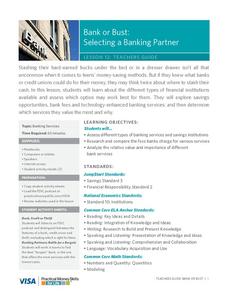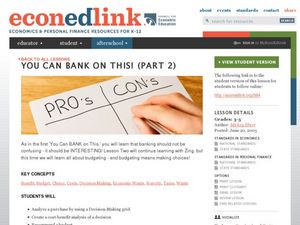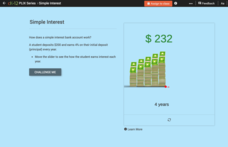Federal Reserve Bank
The Story of the Federal Reserve: Middle School Lesson Plan
After reading the charming cartoon about the United States Federal Reserve, pupils often need to complete activities to retain their learning. The resource does a wonderful job of using class discussion and various written exercises to...
Federal Reserve Bank
The Story of the Federal Reserve System
Prevent the Federal Reserve System from becoming a dry topic for your middle and high schoolers by using an informative, engaging resource! The cartoon takes your class on a journey with aliens from the planet of Novus to observe the...
Federal Reserve Bank
Once Upon a Dime
The story of "Once Upon a Dime" starts like any other fairy tale, but it quickly becomes a story about the value of money and the economic system commonly used before it. Presented as a cartoon, the resource consists of dialogue between...
Federal Reserve Bank
It's Your Paycheck
Beyond reading and arithmetic, one of the most important skills for graduating seniors to have is fiscal literacy and responsibility. Start them on the right financial track with nine lessons that focus on a variety of important...
Federal Reserve Bank
Creditors’ Criteria and Borrowers’ Rights and Responsibilities
Discover what criteria creditors use for making loans (the 3 Cs of Credit), and impress upon your young adults the rights and responsibilities related to using credit. Pupils role play as individuals seeking or providing credit, as...
Federal Reserve Bank
Cash the Check and Track the Dough
From checking and savings accounts to learning the importance of maintaining records and balancing a bank account, prepare your high schoolers to become financially independent and savvy adults, and explore all the intricacies of owning...
Visa
Using Credit Wisely
Receiving credit can be both a benefit and a curse. Prepare your learners to make wise credit choices by studying how credit influences credit scores, identifying the different components of credit cards, and exploring major consumer...
Visa
Bank or Bust: Selecting a Banking Partner
Why shouldn't we just save all our money in our mattress? Couldn't our money disappear? Pupils discover the benefits of utilizing banks and credit unions for saving money, as well as how to evaluate different types of...
Council for Economic Education
You Can BANK on This! (Part 2)
This is part two in a four-part instructional activity on banking and personal finance. For this instructional activity, learners analyze whether or not they have made a good purchase, then discuss how to make an informed decision about...
Carolina K-12
The US Financial System
Here is a unique activity in which learners simulate operations of a fractional reserve banking system, ultimately gaining a better understanding of how banks work and process money creation through lending. It includes a Story of Banks...
Texas Education Agency (TEA)
Piggy Bank vs. Bank – Choosing and Maintaining Your Account
Cha-ching! Using the practical resource, scholars investigate the different types of bank accounts and banking services available. Pupils view a PowerPoint, practice writing checks, and complete a checking account research project.
CK-12 Foundation
Simple Interest
Mathematicians manipulate a mountain of money to solve six questions about simple interest. Question types include several multiple-choice and one discussion.
New York City Department of Education
The Game of Life
Academics use their research skills to create a financial guidebook for young adults. They also learn about the skills needed to be successful as an adult, including how to use credit cards and how to buy a car. Hands-on activities and...
College Board
2004 AP® Macroeconomics Free-Response Questions Form B
A problem set explores how an international crisis could affect the economic health of Canada using authentic materials from College Board. Other questions ask learners to create and evaluate supply and demand curves and examine factors...
College Board
2012 AP® Macroeconomics Free-Response Questions
A fictional country is facing tough economic times and has a few options to tinker with the economy. Which is the best path forward? Scholars consider the best way to reverse a recession using materials from College Board. Other queries...
College Board
2016 AP® Macroeconomics Free-Response Questions
The debate of cupcake versus donuts may seem like a superficial one. However, learners consider whether it makes sense to specialize in producing only one confectionery in a scaffolded problem involving complicated economic concepts....
Federal Reserve Bank
Once Upon a Dime: High School Lesson Plan
Who knew that fairy tales and economics go hand-in-hand? Pupils complete a host of handouts, using everything from graphic organizers to short answer questions to reinforce concepts. They also complete a project that builds on everything...
Council for Economic Education
A Penny Saved
A penny saved is a penny earned! Scholars research the different ways to save money over a lifetime. They investigate the Rule of 72, compound interest, and sub-prime loans to gain an understanding of how banks aid in the saving process....
Council for Economic Education
Banks and Credit Unions (Part 1)
Imagine you have money you want to save ... where do you put it? Pupils investigate the similarities and differences of banks and credit unions as they determine where exactly to place their hard-earned money. Through a WebQuest,...
Federal Reserve Bank
Lesson 4: Back to School
Based on your current level of human capital, how long would it take you to earn $1,000,000? What about your potential human capital? Learners explore the importance of education and experience when entering the workforce, and compare...
Federal Reserve Bank
Lesson 3: A Fresh Start
The members of your economics class may be busy earning graduation credits, but the credit they should be concerned about is their financial credit. The third lesson in a unit about Hurricane Katrina and other events that can result in...
Federal Reserve Bank
Lesson 2: In the Aftermath
Don't wait for a crisis to get your finances together. An economics lesson plan demonstrates the importance of understanding crucial documents, banking basics, and financial tools with the focus on Hurricane Katrina in 2005 and its effects.
Federal Reserve Bank
Financial Literacy Infographic Scavenger Hunt
A activity in personal finance can be the most valuable part of a high school education. Connect the basics of banking with informational reading skills in a activity that prompts teenagers to answer a series of questions based...
Illustrative Mathematics
Bank Account Balance
Represent the ups and downs of a bank account. The two-part task points out that some types of graphs may better show discrete functions than others. Pupils analyze a graph on how well it represents the situation. They develop their own...

























